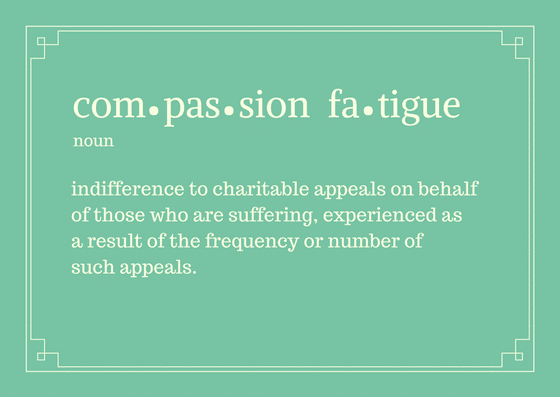Compassion Fatigue
You may have heard the term, but have you thought about how it impacts your daily life? Compassion fatigue used to be something that was only discussed in reference to therapists, caregivers, and aid workers. Now, it’s something that all of us are subject to.
Compassion fatigue is the result of the constant exposure to the hurt and suffering of others. When we are repeatedly exposed to the plights of refugees, human trafficking victims, children in need, school violence, political unrest, and other forms of suffering, we become numb to it. The impossibility of helping all of those who are suffering is overwhelming. And just like we would react to any other stressor in our lives, we develop coping mechanisms.
Compassion fatigue is the coping mechanism to end all coping mechanisms. It means that you are no longer truly engaging in the cause, whether that be combating human trafficking or caring for an aging parent. When you have compassion fatigue, you feel overwhelmingly burdened by the suffering of others. You might start to blame others for their suffering. Sometimes compassion fatigue leads to mental and physical fatigue, as well as depression or anxiety symptoms. People with compassion fatigue often begin to ignore stressful issues altogether – either by ignoring news reports, withdrawing from a loved one in need, or by being in denial about the nature of a problem.
Finding the balance between engaging an issue and identifying with the suffering takes constant practice. Even professionals make ongoing adjustments to their coping and self-care skills.
Tips for Identifying Compassion Fatigue and What to Do about It
You may be suffering from compassion fatigue if:
- You find yourself saying, “I just can’t right now” more often than not when you see or hear reports of suffering.
- You actively avoid news and conversation about topics that you used to feel passionate about
- You begin to blame others for their suffering.
Some tips for combating compassion fatigue are:
- Put on your air mask first. When cabin pressure drops, the reason you put your air mask on first serves two purposes. It reduces the number of overall casualties, and it ensures that you are able to care for others when no one else is there to care for them. You can’t pour from an empty cup, so prioritize self-care early and often when faced with stress.
- Set good boundaries. Try setting a designated time to catch up on the issues that cause you stress, and turn off push notifications in the meantime. Reserving time and space allows you to focus fully on the issue, and then to focus fully on other issues when you’re going about your day.
- Set small, incremental, meaningful goals. Nothing motivates like success. When you feel like you’re making progress, it is easier to stay engaged. For example, your goal today could be to find a fair-trade replacement for your morning cup of coffee. You could set a goal to skip the latte for a few days and donate that money to a cause you love. Celebrate the small successes of the movements you care about and the people you care for, and set goals that you can accomplish apart from them.
Resources for You
TEDx | Patricia Smith | How to Manage Compassion Fatigue in Caregiving
Compassion Fatigue/Vicarious Trauma Training |Office for Victims of Crime Training and Technical Assistance Center
Understanding Compassion Fatigue | SAMHSA
Vicarious Trauma and Human Trafficking | US State Department Office to Monitor and Combat Trafficking in Persons

